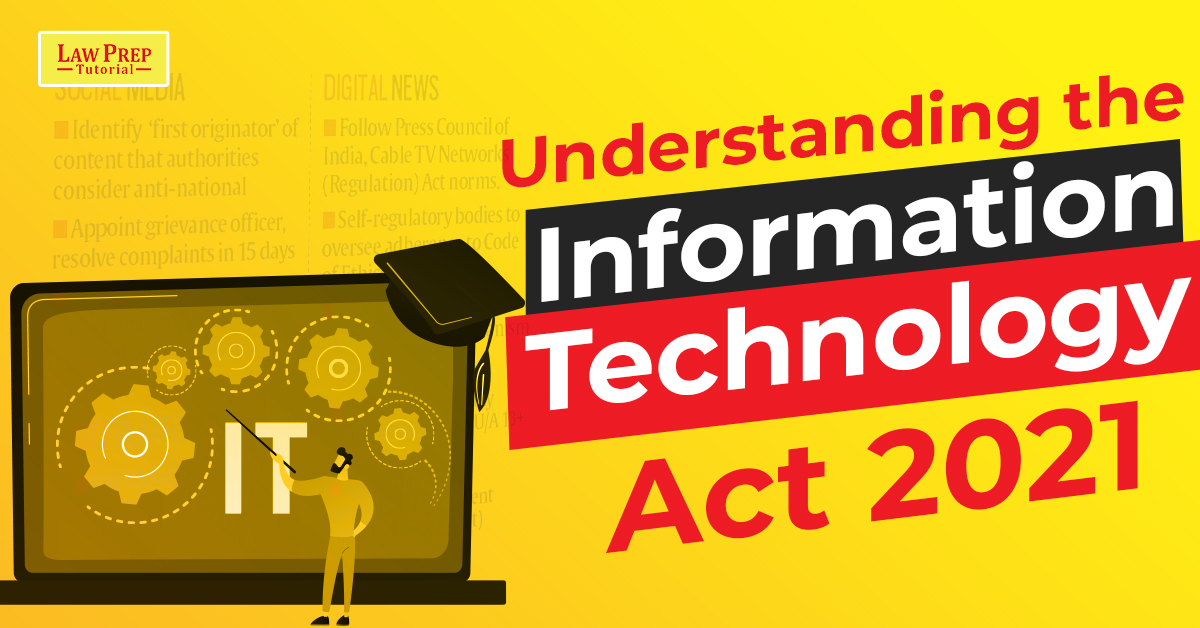
The Indian government announced new social media rules to curb its misuse a few months back. The digital platforms will be required to provide information, including related to verification of identity, to lawfully authorized agencies within 72 hours. The center in new policy notified new, stricter guidelines for social media intermediaries that will make it mandatory for platforms such as Whats App to aid in identifying the “originator” of “unlawful” messages. It will also require the likes of Twitter, Facebook and YouTube to take down such messages within a specific time frame, set up grievance redressal mechanisms as well as assist government agencies in the investigation.
The basic essence of ‘The Information Technology Act 2021‘ (Guidelines for Intermediaries and Digital Media Ethics Code) is a “soft-touch oversight” mechanism to deal with issues such as the persistent spread of fake news, abuse of these platforms to share morphed images of women and contents related to revenge porn or to settle corporate rivalries. Think tanks and experts welcomed the new “well-intended” rules, stating that these bring clarity on the responsibilities of intermediaries.
However, they added that in the current form, these guidelines could undermine the principles of open and accessible Internet and violate the right to privacy and free speech of users, particularly in the absence of robust data protection law. They noted that these could also lead to an erosion of the ‘safe harbour’ protection given to intermediaries under Section 79 of the IT Act.
What is Section 79 of the Information Technology Act?
Section 79 says any intermediary shall not be held legally or otherwise liable for any third party information, data, or communication link made available or hosted on its platform. This protection, the Act says, shall be applicable if the said intermediary does not in any way initiate the transmission of the message in question, select the receiver of the transmitted message, and does not modify any information contained in the transmission.
This means that as long as a platform acts just as the messenger carrying a message from point A to point B, without interfering in any manner, it will be safe from any legal prosecution brought upon due to the message being transmitted.
The protection accorded under Section 79, however, is not granted if the intermediary, despite being informed or notified by the government or its agencies, does not immediately disable access to the material under question. The intermediary must not tamper with any evidence of these messages or content present on its platform, failing which it loses its protection under the Act.
What happens if a social media firm is no longer protected under Section 79?
As of now, nothing changes overnight. Social media intermediaries will continue to function as they were, without any hiccups. People will also be able to post and share content on their pages without any disturbance.
Social media intermediaries such as Twitter, Facebook, and Instagram have so far not appointed a resident grievance officer, chief compliance officer and a nodal contact person as requires under the new rules announced in February. They have also failed to submit monthly action taken reports on grievances and complaints submitted to them by users. Thus, protection under Section 79 of the Information Technology Act does will not hold for them.
Further, Rule 4(a) of the IT Rules, which mandates that significant social media intermediaries must appoint a chief compliance officer (CCO) who would be held liable in case the intermediary fails to observe the due diligence requirements, also undermines the safe harbour protections.
This, legal experts said, means that if a tweet, a Facebook post, or a post on Instagram violates the local laws, the law enforcement agency would be well within its rights to book not only the person sharing the content but the executives of these companies as well.
“Reading the provisions of the IT Rules in consonance with Section 69(a) of the IT Act suggests that this liability can even be criminal in nature where the CCO can be made to serve a prison term of up to 7 years,” said Kazim Rizvi, founder of public policy think-tank The Dialogue.
The absence of the umbrella protection of Section 79 could also lead to situations where employees of the platform may be held liable for no fault on their part, said Prasanth Sugathan, Legal Director at SFLC.in. “This could lead to a situation where employees of social media giants could be held personally liable for failing to ensure that their employer complied with the statutory provisions. The employees could also be held liable for no fault on their part,” he said.
What are the global norms on safe harbour protection for social media intermediaries?
As most of the bigger social media intermediaries have their headquarters in the US, the most keenly watched is Section 230 of the 1996 Communications Decency Act, which provides Internet companies a safe harbour from any content users posts on these platforms. Experts believe it is this provision in the US law that enabled companies such as Facebook, Twitter, and Google to become global conglomerates.
Like Section 79 of India’s Information Technology Act, Section 230 of the Communications Decency Act states that “no provider or user of an interactive computer service shall be treated as the publisher or speaker of any information provided by another information content provider”.
This effectively means that the intermediary shall only be like a bookstore owner who cannot be held accountable for the books in the store, unless it is proven that there is a connection between the writer or publisher of the book and the bookstore owner.
Keep following Law Prep Tutorials for more information on law, CLAT preparation and other related articles.
References–
- https://indianexpress.com/article/explained/intermediary-guidelines-digital-media-ethics-code-facebook-twitter-instagram-7331820/
- https://timesofindia.indiatimes.com/readersblog/third-eye/new-social-media-rules-need-of-the-hour-30137/
- https://www.msn.com/en-in/news/in-depth/explained-social-media-and-safe-harbour/ar-AAKpRo0
Also read – UP Population Bill 2021

Leave a Reply